Disclosure: My dog blog is supported by dog parents just like you. I only recommend products that I would use on my dogs. All opinions expressed here are my own. I sometimes earn a small affiliate commission, at no extra cost to you, when you click through the affiliate link and purchase something. You can read more about my affiliate policy here.
(Article #1 in a series of three on coping with the loss of a dog.)
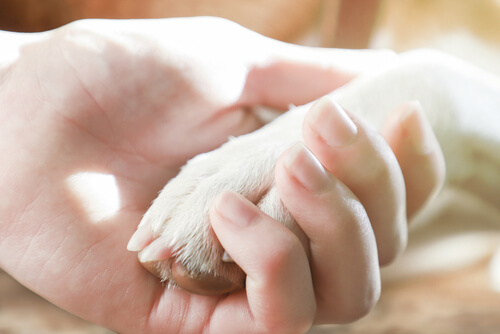
Hands down, the most difficult thing about living with a 4-legged family member is the goodbye. But, somewhere between hello and goodbye, there is so much love. It’s that love you have to draw strength from when coping with the loss of a dog.
Since May, my strength to overcome Bella’s passing has come from 12 years of mutual love. Losing her has been a heartbreaking experience, leaving behind a profound sense of emptiness and loss for me. Furthermore, coping with the loss of a dog has no boundaries.
In fact, many dog parents compare coping with the loss of a dog to losing a family member. Others compare it to losing a close friend. I’m with the first group here… and the pain has been overwhelming. I believe it’s because the bond between dogs and their humans is a strong one.
When it comes to coping with the loss of a dog, it’s important to allow healing time. Furthermore, recognizing and accepting that your dog is gone is the first step towards healing. Healing will happen when you go through the pain.
Therefore, take the time to work through all of your feelings. It’s important to not hold it in, or healing won’t happen. So, take time to release your emotions in your own way.
Why Coping With the Loss of a Dog is Hard
First of all, many dog owners perceive their furry companions to be their soulmates. Some might call them a special heart dog. Regardless of what we call them, these fur babies are very cherished and loved.
For instance, dogs accept us for who we are! Furthermore, it’s that unconditional love they provide us with that makes us appreciate sharing life with them.
So, it’s normal to feel a sinking feeling of depression, maybe even desperation, after losing a dog. For instance, dogs become very much a part of the family unit. Therefore, dogs and their humans form a state of balance, living together day in and day out.
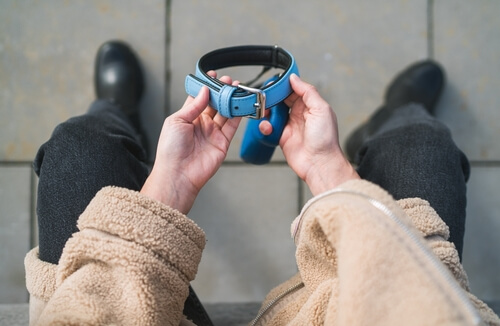
For us dog parents, a dog is not “just a dog”, but a definite family member. For instance, they bring companionship, fun, and joy to our lives. A dog can add structure to our day, in addition to keeping us active and social.
In fact, they can even provide a sense of meaning or purpose. However, when a dog accident, aging, or some terminal illness results in death, the balance is off kilter. In addition, whether sharing one year or 15 years, the balance of life together is gone.
Secondly, coping with the loss of a dog is hard because grief isn’t something most of us learn how to get through. Instead, we learn how to avoid it and stop crying. However, this is not healthy!
Although loss is inevitable when sharing life with dogs, there are healthy ways to cope with the pain. In addition, there are healthy ways to come to terms with the grief of losing a furry family member.
Coping With the Loss of a Dog – 1st, Share With Others
“Unsealed grief puts a lock on your heart. It’s so important for people to realize that the key to unlocking your heart is to face the guilt and grief. Now, facing it is often very, very hard for people. Grief is meant to be shared. It’s meant to be expressed in positive, healing ways rather than stuffing it.”
Nancy Gordon, Loss and Grief Coach
According to Nancy, finding support from others is an important first step when dealing with pet loss. However, she adds, make sure those others understand what it means to lose a beloved animal.
Furthermore, Nancy explains, we need support from people who truly understand, so that we can comfortably share, express, and process our grief.
Although coping with the loss of a dog is different for each person, it’s not any less painful. Furthermore, many people find it hard to express their feelings. For instance, not everyone around them understands the depth of their pain.
More times than not, people who are not dog lovers just don’t understand grieving a dog. In fact, they wonder why coping with the loss of a dog is such a big deal.
“If someone has never experienced this kind of relationship, they genuinely don’t know how important it is to those of us who have.”
Moria Anderson Allen, author Coping with Sorrow on the Loss of Your Pet
Tips for When Others Devalue Your Loss

It’s a fact that dog loss is not appreciated by everyone. Therefore, this fact can make grieving for the loss of a dog more difficult. For instance, some people assume that dog loss shouldn’t hurt as much as human loss. While others somehow believe it’s inappropriate to grieve for a dog.
It’s important to realize that they may not understand because they don’t have a dog of their own. Therefore, they are unable to appreciate the companionship and love that a dog can provide.
Following are a few tips for dealing with those who devalue your loss…
- Don’t argue with others about whether your grief is appropriate or not.
- Accept the fact that the best support may come from outside your usual circle of family and friends.
- Seek out others who have lost pets. They can better appreciate the magnitude of your loss. In addition, they may be able to suggest ways of getting through the grieving process.
Join a Support Group
Therefore, it’s important to surround yourself with supportive family members or friends. However, sometimes that support is hard to find from them. So instead seek out like-minded people who have been through coping with the loss of a dog.
Heidi McBain, a licensed professional counselor based in Texas, suggests starting with social media and online groups. She also says that private therapy and support groups offer a safe place. For instance you can open up and connect with others going through similar experiences.
So if you aren’t finding support from people closest to you, then consider finding it from unknown people. In other words, join a pet loss group where others are compassionate and understanding of your grief.
For instance, a great place to start is the AKC Pet Loss Support Group on Facebook. This group gives the opportunity to heal by sharing thoughts, memories, and support with other dog lovers.
“It’s important to understand you shouldn’t grieve alone. The most important thing you can get out of a group is the sense that there is nothing wrong with you for feeling the way you do.”
Mary Brosnan, social worker and leader of the AKC pet loss FB group
In addition, another online safe place to consider is the Rainbow Bridge Pet Loss Support Center. This site offers a pet loss forum as well as a pet loss chat room. Furthermore, there is a wealth of information for coping with the loss of a dog. There is even a section of pet loss hotline phone numbers with websites.

Now This Is Something To Bark About!!
Coping With the Loss of a Dog – 2nd, Embrace Self-Love
After allowing yourself to feel and express your grief, you need to embrace self-love and self-compassion. For instance, recognize that your feelings are normal. Grief is a natural process in relationship to loss. There’s absolutely nothing wrong with you, and you’re NOT crazy!
“If ever there is tomorrow when we’re not together… there is something you must always remember. You are braver than you believe, stronger than you seem, and smarter than you think. But the most important thing is, even if we’re apart… I’ll always be with you.”
Winnie the Pooh
Y’all, your fur baby knew this about you, so believe in yourself. Give yourself that self-love and self-compassion. Embrace the journey of dog loss, and work through transformational grief.
When you do this, it will lead to hope, healing, growth, and resilience. Therefore, when you grow through your grief, you honor your pet. Furthermore, you find meaning.
Please don’t judge yourself so harshly for the intense, overwhelming sense of loss when your dog dies. I know our society tells us that we should just get over it. They are wrong!
Seeking Professional Help
Furthermore, sometimes embracing self-love is seeking professional help. It might just be one phone call, but it might be the first step in the healing process.
For instance, if you’re overcome with grief and it’s touching every aspect of your life, then consider counseling.
“Maybe people feel they can no longer function. They’re spending a lot of time crying and depressed and unable to keep up with their regular routine. This reaction is normal. When we experience the loss of a loved one, we do strange things. For example, perhaps we put the orange juice in the cabinet instead of the refrigerator. Then, we might find the orange juice hours or days later.”
Ann Beyke, MA, LPC, Pet Loss Grief Counselor
Ann suggests using a resource like Psychology Today to find a counselor you feel comfortable with. Also, she says to look for counselor listings that have a picture of them with their animal companion. For instance, this can be an indicator that they understand pet loss and grief, she says.
In addition, Ann mentions finding a pet loss grief specialist before needing one can be beneficial. Therefore, you can talk through things such as anticipatory grief, hospice care, at-home euthanasia and other concerns.
To learn more about Ann and her approach to helping pet parents with grieving, visit Pet Loss Counselor.
More Healthy Ways For Coping With the Loss of a Dog
It’s important to understand that sorrow and grief are normal and natural responses to death. Coping with the loss of a dog is no different than coping with the loss of friends and loved ones.
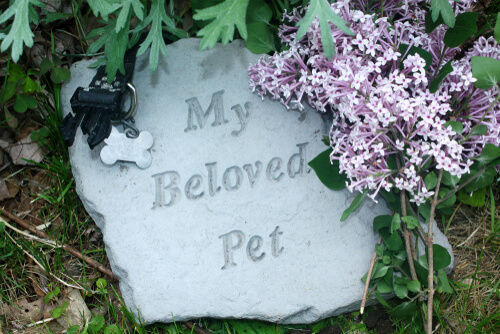
In addition, it’s important to understand that all grief, whether for humans or animals, takes time to process. However, there are healthy ways to cope with the pain. As mentioned above, the first two healthy ways are sharing your grief with others and embracing self love.
Following are a few more suggestions…
- Don’t let anyone tell you how to feel! Furthermore, don’t tell yourself how to feel either. Your grief is yours, so no one else can tell you when it’s time to “move on”. Nor can they tell you to “get over it.” Plus, you can’t tell yourself that! It’s okay to let yourself feel whatever you feel, whether it’s anger, sadness, or even joy. For instance, it’s okay to laugh and feel joy in memories. You’re entitled to do this without embarrassment or judgement, and it’s okay to let go when you’re ready.
- Rituals can help with healing. For example, a funeral may help you and your family openly express your feelings. Who cares if other people think it’s inappropriate! You do what feels right for you!
- Create a legacy or a memorial. For instance, plant a tree in memory of your pet, or compile a photo album or scrapbook. More ideas will follow in this three part series on coping with the loss of a dog.
- Looking after yourself goes hand in hand with embracing self love. The stress of losing a dog can quickly deplete your energy and emotional states. It’s important to look after your physical and emotional needs. Furthermore, this will help you get through this difficult time. So, spend time face to face with people who care about you, and eat a healthy diet. In addition, get plenty of sleep, and exercise regularly to release endorphins and help boost your mood.
- If other pets are in the home, try to maintain a normal routine. Surviving pets can also experience loss when a dog dies, or they may become distressed by your sorrow. Therefore, maintain their daily routines, or even increase exercise and play times. For instance this will be beneficial for them and can also help to elevate your mood and outlook. A further look into the grieving process of surviving pets will follow in this three part series.

The Grieving Process Comes in Stages
Whether coping with human loss or pet loss, grieving is an individual experience. Plus, there is no “normal” timetable. For some dog parents, feeling better happens in weeks or months. However, for other dog parents, the grieving process takes years.
So, the key here is that it’s a process. The process has to naturally unfold. Therefore, it’s important to be patient with yourself and let it.
Elisabeth Kübler-Ross pioneered the first research on what we experience when grieving. She identified five stages of grief that everyone goes through after losing a loved one.
Those stages are:
- Denial
- Anger
- Bargaining
- Depression
- Acceptance
Elisabeth found that not everybody goes through all of the stages in the same way. Plus, some will not go through them in perfect order. Furthermore, she pointed out years later that the stages of grief are non-linear. She also says to not expect a predictable progression.
Many grieving dog parents report feeling as if their emotions go up and down. Therefore, they wonder whether they will ever get over the loss. Sadly, the answer is that we never really “get over” loss. However, we only learn how to better cope with it. So, the only sure way to deal with grief is to go through it and deal with it.
Stage 1: Denial
Nothing can prepare you for the death of your fur baby; not even a long illness. For instance, when death knocks, whether expected or unexpected, a feeling of shock and deep sadness follows.
“In the denial stage, you are not living in ‘actual’ reality, rather, you are living in a ‘preferable’ reality. Interestingly, it is denial and shock that help you cope and survive the grief event. Denial aids in pacing your feelings of grief. Think of it as your body’s natural defense mechanism saying, ‘Hey, there’s only so much I can handle at once.’”
Christina Gregory, PhD
Therefore, denial helps us to manage the painful feelings at an unconscious level one piece at a time. It helps provide a reprieve from the intense pain.
Stage 2: Anger
First of all, anger is simply a symptom of pain. Plus, it can take on different forms during the grieving process. For instance, there is anger with self, with God, with others, and with just the whole situation.
Therefore, anger is a sign of pain against the unfairness of life. It’s important to accept the anger for what it is. In addition, it’s important to realize there are healthy ways to handle it.
For example, a healthy way to deal with anger would be to talk about it. Other ways could be physical, such as running, engaging in a sport, or punching a pillow and yelling.
Furthermore, Elisabeth explains that guilt is often part of the anger stage, and accompanies the bargaining stage. She says that although guilt is considered normal during the grieving process, it’s possibly the most painful.
Most importantly, it’s important to not let the guilt get out of hand. Furthermore, it’s unproductive to mentally torture yourself with the “coulda, woulda, shoulda.” Instead, it is far more productive to cherish the good memories. So, when guilt raises its ugly head, shift your focus to positive thoughts.
Stage 3: Bargaining
Bargaining means to “negotiate the terms and conditions of a transaction.” However, it’s not a business deal we are coping with. Instead, we are coping with the threat of loss and the actual loss.
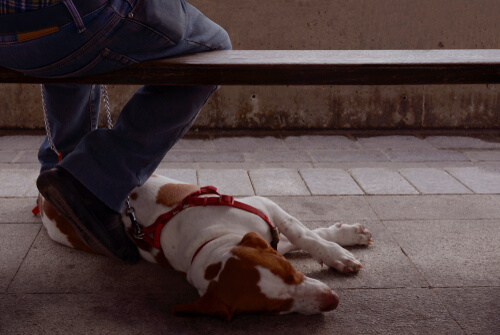
For instance, bargaining can show up early in anticipatory grief. Anticipatory grief is also known as “pre-grieving.” Furthermore, it is the acknowledgment of impending death. Therefore, this anticipation leads to several emotions, such as shock, hope, fear, frustration, and anxiety. You can read more about anticipatory grief, here.
During this anticipation of death, we may bargain and even hope for a different outcome involving our dog. For example, we may bargain for our dog to not have cancer, or suffer from the disease process. Then, we may bargain for our dogs’ passing to be peaceful.
Once death occurs, bargaining may look different. It then involves hoping that we will see our dog again in the future. We may bargain for our dog to watch over us. Or, we may bargain for them to be in a better place. Furthermore, we may bargain for our other household pets to be spared from death.
At some point, as bargaining subsides, our mind reaches the clear conclusion that our dog is truly gone.
Stage 4: Depression
Once the initial shock and anger subsides, the loss becomes more and more tangible. Furthermore, we now will delve deeper into the present state. It is here that our grief will enter a deeper level, focusing on the emptiness sensation.
Plus, it is at this stage where it becomes crystal clear that our dog will never come back. Therefore, feelings of apathy and exhaustion may take over. Although it appears similar to clinical depression, it’s a very normal response to a loss.
In addition, sadness and depression must be experienced deep to the core for healing to happen. Therefore, it’s important to learn to accept it rather than push it away or mask it.
“Invite your depression to pull up a chair with you in front of the fire, and sit with it, without looking for a way to escape. Allow the sadness and emptiness to cleanse you and help you explore your loss in its entirety.”
Elisabeth Kübler-Ross, Swiss-American Psychiatrist, a pioneer in near-death studies, and author
As we get stronger in our grief process, depression will eventually leave. However, it doesn’t mean it won’t pay a visit every now and then.
Stage 5: Acceptance
While acceptance may appear to provide a sense of closure, it doesn’t mean we’ve reached the journey’s end. For instance, we really never get over our dog’s death, we just get through the grief process.
“Many people mistakenly believe that ‘acceptance’ means we are ‘cured’ or ‘all right’ with the loss. But this isn’t the case at all. The loss will forever be a part of us, though we will feel it more sometimes than others. Acceptance simply means we are ready to try and move on – to accommodate ourselves to this world without our loved one.”
Dr. Christina Hibbert, Clinical Psychologist, best selling author, speaker, and thought leader
Therefore, acceptance entails recognizing the loss and learning to live with it or come to peace with it. Although we may feel a little guilty, we start having more good days than bad.
For instance, our energies are no longer focusing on the loss, but investing in life again. Although our grief may seem a distant memory, it can make a comeback out of nowhere. However, at this point it may feel almost bittersweet compared to the raw sensations of the earliest stages.
In Conclusion
So, coping with the loss of a dog is hard! However, please know that the hard feelings you are experiencing now will become more tolerable with time. Furthermore, death doesn’t represent the whole relationship you had with your dog.
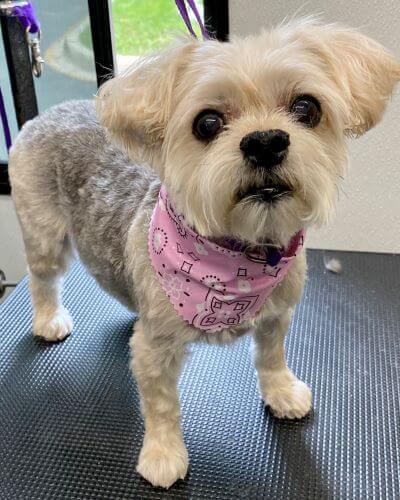
I got to have Bella for 12 precious years. Although 12 years is a good amount of living for a dog, I still wanted more! A lot happens in the lifetime of a dog… a lot happens in 12 years of a person’s life.
In the 12 years with Bella, I had so many different experiences. And through it all, she was there. She was so much more than just a dog. She was truly family. So it’s a beautiful thing to grieve deeply for a four-legged family member. It simply means the bond shared was something special.
Although there is a limit on time with our dogs, we willingly give our hearts to them anyway. We do it because it’s worth it. Furthermore, the joy outweighs the inconvenience and exasperation. Plus in the end, the joy outweighs the heartache.
And, oh how my heart aches! Bella, you were my favorite hello and my hardest goodbye. Goodbye, sweet baby. You were such a good girl. Thank you for all of the joy.
What has helped you cope with the loss of your dog? Please leave a comment below and share your story.
You might enjoy reading these posts from our blog:
You can save this information by using one of the following images to pin to your Pinterest account.
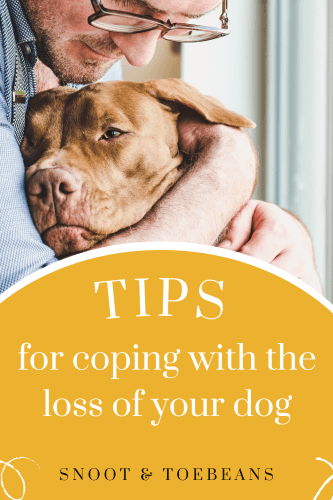
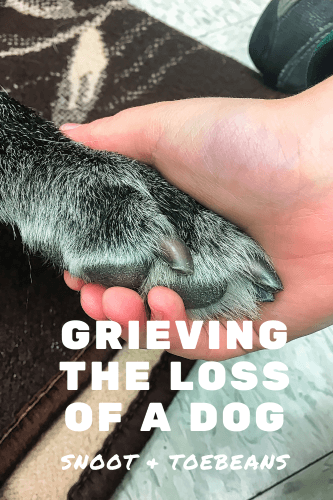
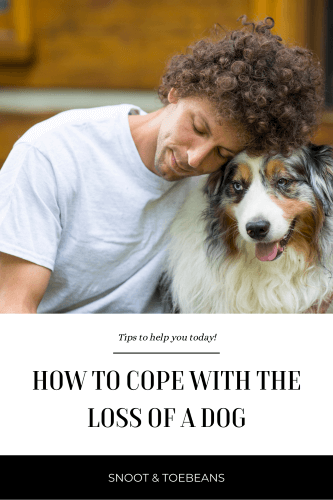

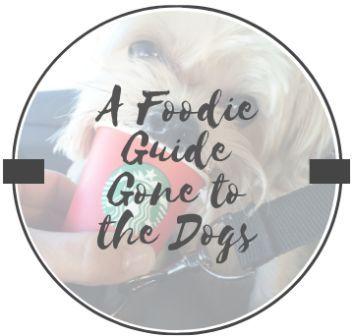

I recently experienced the loss of my beloved pet and it was an incredibly difficult time. I found myself struggling to cope with the grief and feelings of emptiness. However, I was able to find comfort and support through various resources, including support groups and online forums. It’s important to know that you are not alone and there are others who understand what you’re going through. Take the time you need to grieve and remember your pet in your own way. It’s okay to seek help and support during this time. Remembering the happy times and the love you shared with your pet can help ease the pain. Hang in there.
Hi Lucy,
Thank you so much for your sweet and comforting words. You are correct…there are so many resources to find comfort and support! Thank you for visiting our website and for taking the time to write me a message of comfort.
Jeana